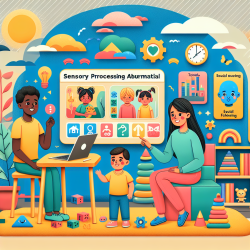The relationship between sensory abnormalities (SAs) and social functioning in children is critical, especially for practitioners focused on enhancing outcomes for children. A recent study titled "Characterizing Social Functioning in School-Age Children with Sensory Processing Abnormalities" provides valuable insights into this relationship. This blog will highlight key findings from the study and suggest practical steps for practitioners to improve their skills and encourage further research.
Key Findings
The study revealed several important points:
- Children with SAs demonstrate impaired social functioning on standardized measures.
- Children with SAs showed worse social functioning than typically developing (TD) children and equivalent social functioning to children with autism spectrum disorder (ASD).
- Increased SAs were associated with poorer social functioning across all groups.
Practical Steps for Practitioners
Practitioners can implement several strategies to improve social functioning in children with SAs:
1. Incorporate Comprehensive Assessments
Use tools like the Social Responsiveness Scale (SRS-2) and the Vineland Adaptive Behavior Scales to assess social skills and adaptive functioning comprehensively. These tools can help identify specific areas of need and track progress over time.
2. Tailor Interventions
Based on assessment results, design interventions that target both broader social skills (e.g., reading social cues) and specific skills (e.g., conflict resolution during play). Peer-mediated and school-based interventions have shown promise in improving social skills in children with ASD and may be beneficial for children with SAs as well.
3. Engage Parents
Increased parental support during play interactions can be crucial. Train parents to help their children manage conflicts, understand social rules, and develop foundational play skills. This can create a supportive environment that fosters social development.
4. Address Co-occurring Psychiatric Symptoms
Children with SAs often have co-occurring psychiatric symptoms such as ADHD or anxiety. Effective intervention should address these symptoms to improve overall social functioning. For instance, social skills interventions that consider co-occurring conditions have been more effective in children with ASD.
Encouraging Further Research
While the study provides valuable insights, further research is needed to explore the relationship between SAs and social functioning in diverse populations. Practitioners are encouraged to contribute to this research by:
- Participating in longitudinal studies to track the long-term effects of interventions.
- Exploring the impact of different contexts on social functioning (e.g., school vs. home environments).
- Investigating the role of communication skills in social functioning among children with SAs.
Conclusion
Understanding and addressing the social functioning deficits in children with SAs is crucial for their overall development and well-being. By incorporating comprehensive assessments, tailoring interventions, engaging parents, and addressing co-occurring psychiatric symptoms, practitioners can significantly improve outcomes for these children. Further research will continue to shed light on effective strategies and interventions. To read the original research paper, please follow this link:
Characterizing Social Functioning in School-Age Children with Sensory Processing Abnormalities.










